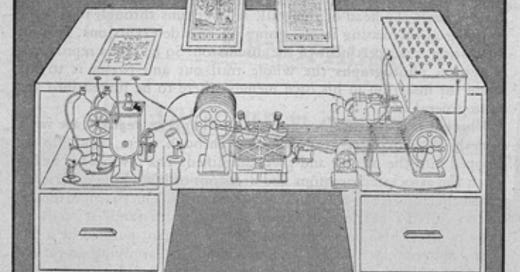“Consider a future device … in which an individual stores all his books, records, and communications, and which is mechanized so that it may be consulted with exceeding speed and flexibility. It is an enlarged intimate supplement to his memory.”
— Vannevar Bush from As We May Think on the “memex”
I came across this tweet today that really connected with a lot of the things that have been on my mind lately:

I’ve been feeling a growing gnawing at the fact that it’s such a big mental hurdle to find something that you’ve seen online when you’re reminded of it. We use so many different products and apps, and all of them have their own data and methods of saving that data. Pretty much every app that involves users consuming data and creating data has some method of “liking” things and “bookmarking” things and listing out the “history” of things you’ve seen. Why is it that for any piece of content that we’ve consumed or created that we have to search across an ever-growing list of apps and adapt our flow to each of those app’s custom workflows for finding old artifacts?
Companies sometimes provide APIs to give us access to the data, but there are often no strong incentives for maintaining or extending these APIs. In fact, companies can break those APIs at any point if maintaining the current state no longer aligns with their interests. Because of this, this universal structured standard for getting data out of apps isn’t something that we can rely on as end-users. An added issue is that we produce and consume data on many different devices in many different contexts, whether on our computer, our phones, or our TVs and watches and even our toasters(?) as the universe of IoT devices grows ever-larger. In order to create a digital repository of all of the information that we consume and all the thought that that input triggers, we need to be able to access the data that we view and create through all these different mediums without relying on those products to provide us sanctioned access retroactively.

This idea of a personal panopticon solves this problem by proactively capturing all the content you consume and create at the moment of inception and putting it directly into our hands from the start. Recording everything that you’ve ever seen could get tedious, but the important piece is having all the data there in one place in a form that you can control. With this technology embedded on all of our devices, everyone would be able to build their own personal search engine on top of their universe of digital data.
This access to and control over our data is what will enable us to build situated software, where end-users have control over how their software operates rather than developers and corporations behind closed doors. It’s not clear how we shift the landscape meaningfully towards a world where this relationship with our digital data is the default for software consumers, but I look forward to the day when we can tinker freely with our software to cater it towards what we want (this is the future I hope to help push towards with my work at Coda).
This is the 37th installment in my experiment of publishing raw, lightly edited mini-essays every day towards achieving 100 public pieces. Check out the rationale and the full list here or view my evergreen, longer pieces on my website.





Oooh! Personal search engine sounds pretty neat as long as no one else has access to it 😂 I guess today's version is made using a searchable document platform that has a web clipper 😅